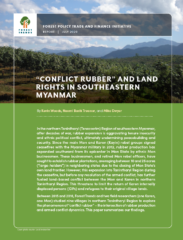
Between 2015 and 2016, Forest Trends conducted a research in Tanintharyi Region with MRLG support to explore the phenomenon of “conflict rubber” – the intersection of rubber production and armed conflict dynamics. After decades of war in northern Tanintharyi Region, rubber expansion is further aggravating tenure insecurity and reviving historical grievances between Mon and Karen communities, ultimately undermining prospects for peacebuilding and security. This has implications for other interests in the region and comes at a time when the Myanmar government is positioning rubber as a strategic crop for export and global buyers are simultaneously looking for new suppliers and implementing their own responsible sourcing commitments.
Key findings of this case study include:
- Rubber expansion in northern Tanintharyi demonstrates that “land grabbing” and dispossession can result from smaller-scale crop production, in addition to large-scale agricultural investment
- By locking in private land use ownership in former Karen villages, where communities were forced off their lands during a previous counterinsurgency, Mon “large-holders” are making it impossible for Karen communities to return to their customary lands
- This land conflict undermines possibility for reconciliation and has preempted attempts at land restitution. These territorial and political dynamics have aggravated historical animosity between the two major Ethnic Armed Organizations in the area, the New Mon State Party (NMSP) and Karen National Union (KNU), with rubber expansion enabling the NMSP to gain de facto territorial control.
Forest Trends also examined implications of these findings in light of the nascent movement for rubber companies to “green” supply chains, implement traceability and transparency measures, and promote responsible sourcing of latex. International buyers of rubber with commitments in place that wish to source from Myanmar, will need to implement high standards of due diligence and grievance procedures to ensure their purchases do not contribute to (or further aggravate) armed conflict in Myanmar.
Read the full report here

Rejoignez-nous sur
LinkedIn X Facebook